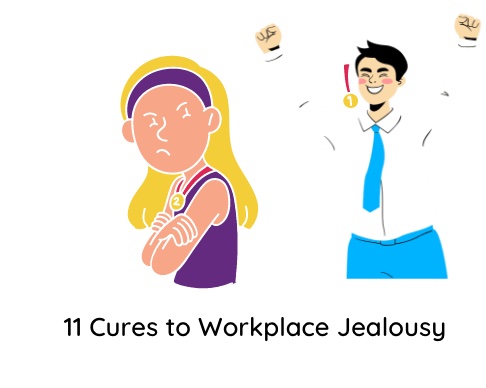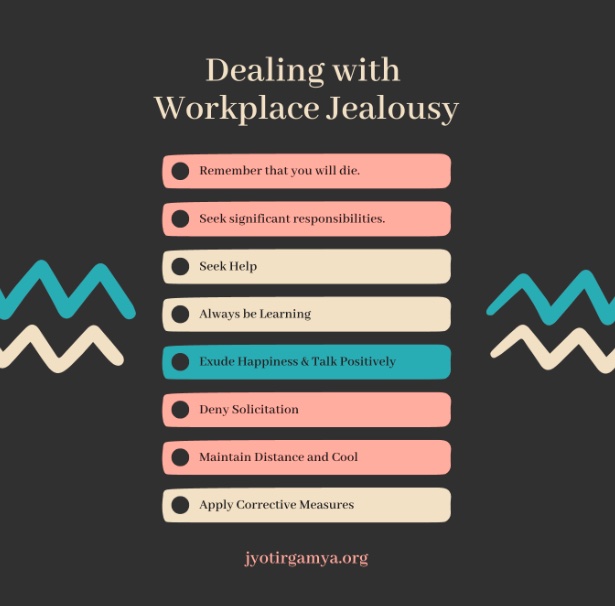Eleven Cures to Workplace Jealousy
Story
Shobha graciously invited her colleague, Rajesh, for a delightful dinner. She eagerly urged him to order his favorite dish, her eyes sparkling with anticipation as she sat across the table.
As the meal commenced, Shobha’s taste buds were met with an average culinary experience, but her attention drifted towards Rajesh, who savored each bite with genuine delight. A pang of envy gnawed at her as she watched him relish the flavors she found merely ordinary.
Throughout their conversation, Shobha couldn’t shake off the nagging feeling that she had allowed Rajesh to have all the enjoyment. This pattern seemed to permeate every aspect of her life. Even if the sun were to rise from the west, Shobha would still harbor disdain for her colleagues' happiness and growth.
Her eyes constantly searched for vulnerabilities in those around her, seeking opportunities to exploit and bring them down. But instead, a malicious pleasure fueled her as she highlighted their flaws and revealed her perceived superiority.
Whenever she noticed a colleague feeling down, Shobha casually asked, “What’s wrong with you?” Little did they know that, more often than not, she had played a hand in orchestrating their troubles. No stone remained unturned in her quest to ensure others' failures.
Shobha’s jealousy knew no bounds, permeating every aspect of her life. It sabotaged her role as a wife, a mother, and a working professional. Her obsession with making others feel inferior consumed her energy and attention.

Jealousy, especially in the professional realm, can be a silent struggle that few openly discuss. The fear of appearing petty or selfish often prevents individuals from acknowledging their feelings of envy toward others. It’s easier to fan the flames of jealousy than to confront and extinguish them.
However, for Shobha, there came a realization—an awakening that this toxic jealousy was eclipsing her happiness. So, with newfound determination, she embarked on a journey to overcome her insecurities, celebrate the success of others, and redirect her focus toward personal growth and fulfillment.
Shobha found the courage to reflect on her motivations and the patterns of jealousy that had plagued her interactions with colleagues. She realized that her focus needed to improve, causing her to miss out on her opportunities for growth and fulfillment.
In the weeks that followed, Shobha embarked on a transformative journey. She made a conscious effort to celebrate the accomplishments of her colleagues genuinely, offering words of encouragement and support instead of harboring envy. She redirected her energy towards personal development, investing time in honing her skills and seeking new avenues for growth.
Over time, Shobha blossomed into a beacon of inspiration and positivity within her workplace. Her genuine admiration for others' achievements fostered a culture of collaboration and mutual success. The envy that had once held her captive gradually gave way to a sense of fulfillment and joy that stemmed from her accomplishments and the success of those around her.

In the end, as Shobha stood on the precipice of her newfound liberation, she knew that she had unlocked the secret to true happiness — embracing her journey while wholeheartedly celebrating the victories of others.
Introduction
In this article, we will explore workplace jealousy in-depth, discuss its implications, and provide practical tips to help you navigate and overcome jealousy in your workplace.

What is workplace jealousy?
Workplace jealousy is a feeling of envy or resentment that one employee may feel towards another employee who is perceived to be more successful or favored. This feeling can be triggered by factors such as the other employee’s job title, salary, performance reviews, or relationships with co-workers or managers.
Examples of workplace jealousy
Case studies and real-life examples provide valuable insights into the effects of workplace jealousy and how it can be effectively managed. Let’s explore a few scenarios:
-
In Company X, Alice and Bob were vying for a managerial position. Alice’s jealousy towards Bob’s effortless progress affected their working relationship and team dynamics. Recognizing the issue, their supervisor intervened and organized a workshop on communication and conflict resolution workshop. Alice and Bob addressed their insecurities and worked collaboratively toward their professional goals.
-
Department Y: In Department Y, a team leader, Sarah, noticed a significant decline in productivity and morale. After investigating, she discovered jealousy brewing due to favoritism towards a colleague, John. To tackle the issue, Sarah initiated team-building activities that fostered trust, encouraged sharing of accomplishments, and emphasized individual strengths. Over time, the team members became more supportive of each other, reducing jealousy and boosting performance.
-
Start-up Z faced challenges from compensation discrepancies. Emma, a high-performing employee, discovered her colleague, Rajesh, was receiving a higher salary for a similar role. The management swiftly addressed the issue by implementing a transparent salary review process.
These case studies highlight the significance of timely intervention and proactive measures in addressing workplace jealousy. As a result, organizations can create an environment where employees feel valued by promoting open communication, trust-building, and fairness, leading to improved collaboration and overall satisfaction.
Common Causes of Workplace Jealousy
Competition for promotions: When employees perceive that others are getting preferential treatment or promotions ahead of them, it can lead to feelings of jealousy. This could arise from more transparency in the promotion process or a belief that they deserve more advancement.
Salary disparities: Unequal pay or significant differences in salary among colleagues can trigger jealousy. Employees may feel resentful and undervalued when they perceive others earning more for similar work, leading to strained relationships and a hostile work environment.
Recognition and rewards: When specific individuals receive consistent recognition and rewards for their achievements while others feel overlooked, it can fuel jealousy. Feeling underappreciated or overshadowed can breed a sense of unfairness and create tension among coworkers.
Perceived favoritism: If employees believe that their managers or supervisors are showing favoritism towards specific individuals, it can stir up feelings of jealousy. This perception may arise from personal connections, discriminatory treatment, or seemingly preferential treatment, leading to resentment and a lack of trust within the team.
Lack of professional growth opportunities: When employees feel stagnant in their careers or see limited opportunities for growth within the organization, they may become envious of colleagues who are progressing or gaining new skills. This can fuel a sense of inadequacy and jealousy toward those advancing professionally.
By addressing these common causes of workplace jealousy, organizations can foster a more harmonious and supportive work environment. In addition, understanding these triggers can help leaders implement strategies to mitigate jealousy and promote a culture of fairness, equality, and growth.
Impact of workplace jealousy
Workplace jealousy can have significant repercussions for both individuals and organizations. It creates a toxic environment that hampers productivity, collaboration, and overall job satisfaction. Let’s explore the critical impacts of workplace jealousy:
Decreased Employee Morale: When jealousy thrives in the workplace, it erodes employee morale. Envious colleagues may feel undervalued or overlooked, leading to a negative mindset and reduced motivation. This can result in a decline in overall employee engagement and job satisfaction.
Hindered Teamwork: Jealousy breeds resentment and undermines teamwork. When individuals are consumed by envy, they may engage in behaviors such as withholding information, sabotaging others' work, or creating conflicts. These actions hinder effective collaboration and damage the cohesiveness of teams.
Reduced Productivity: Workplace jealousy takes a toll on productivity levels. Employees preoccupied with jealousy are distracted from their tasks, focusing instead on comparing themselves to their peers or finding ways to undermine them. This preoccupation wastes time and energy, leading to decreased efficiency and output.
Increased Employee Turnover: Pervasive workplace jealousy can contribute to high employee turnover. Individuals who experience jealousy may seek alternative job opportunities where they perceive a fairer and more supportive work environment. In addition, high turnover disrupts continuity and incurs costs associated with recruitment and training.
Negative Organizational Culture: A culture tainted by workplace jealousy has detrimental effects on the organization. It fosters an environment of distrust, insecurity, and unhealthy competition. Such a culture stifles innovation, creativity, and collaboration, impeding the organization’s ability to thrive and adapt to changes.
To mitigate the impact of workplace jealousy, organizations must address this issue proactively and create a positive work environment that promotes fairness, recognition, and open communication. By doing so, organizations can foster a culture of trust, engagement, and mutual support, resulting in improved productivity and employee well-being.
Signs and symptoms of Workplace Jealousy
Signs and symptoms of workplace jealousy can manifest in various ways. Therefore, awareness of these indicators is crucial to promptly identify and address the issue. Here are some key signs to watch out for:
Hostile or passive-aggressive behavior: Employees experiencing jealousy may exhibit increased hostility or aggression towards their colleagues. This can include sarcastic remarks, undermining others' work, or intentionally excluding individuals from team activities.
Excessive criticism: Jealous individuals often find fault with others and excessively criticize their colleagues' work or achievements. They may downplay others' accomplishments or engage in constant nitpicking.
Overly competitive attitude: A strong sense of competition is customary in the workplace, but jealousy can intensify it to an unhealthy level. Employees may constantly compare themselves to others, seeking ways to outperform or overshadow their colleagues.
Spread of rumors and gossip: Workplace jealousy can fuel the spread of rumors and gossip. Jealous individuals may engage in negative conversations or share false information about their coworkers to tarnish their reputation or undermine their success.
Isolation and social withdrawal: Jealousy can lead to feelings of isolation and social withdrawal. Jealous employees may distance themselves from others, avoiding social interactions or team collaborations.
Lack of teamwork and cooperation: Individuals experiencing workplace jealousy may need help to work as part of a team. They may resist collaborating, hoard information, or fail to contribute effectively to group projects.
Increased stress and anxiety: Jealousy can significantly impact an individual’s well-being. Jealous employees may experience heightened stress and anxiety, affecting their performance and job satisfaction.
Obsession with comparison and recognition: Constantly comparing oneself to others and craving recognition or validation are common traits of jealous individuals. They may become overly focused on external validation rather than their personal growth.
Recognizing these signs and symptoms is vital for early intervention and preventing the negative impact of workplace jealousy. In addition, by addressing these issues proactively, organizations can foster a healthier and more harmonious work environment for all employees.
Role of Managers in Preventing and Dealing with Workplace Jealousy
Managers can play a role in preventing and dealing with workplace jealousy by:
-
Creating a positive and supportive work environment.
-
Providing regular feedback to employees.
-
Promoting fairness and equality in the workplace.
-
Addressing any issues of workplace bullying or harassment.
By taking these steps, managers can help to create a work environment where employees feel comfortable and supported and where jealousy is less likely to take root.
Let us hear in detail what a senior human resource professional and counselor has to offer.
Strategies to Deal with Workplace Jealousy

1. Remember that you will Die
I don’t say this to scare you, but accepting that you will die will help you minimize your bad days and maximize your good ones.
Accepting your mortality forces you to prioritize your goals and use your time better.
Because you have limited time, you should only concentrate on what you can control and regard everything else as something you must accept, such as the weather.
In a workplace scenario, you should concentrate on your career. Understand that you have limited time to waste on frivolous things like envy. Instead, be happy for your peers’ growth.
You defeat envy and jealousy by realizing that those emotions serve no purpose for you and have nothing to do with the trigger but with your insecurities in your own life.
You overcome envy and jealousy by focusing inward attention to address your insecurities.
You are not envious of your friend’s career; instead, you are dissatisfied with your own.
You will die one day, so work on your personal goals and advance your career.
2. Seek more significant responsibilities
Several variables outside financial status may cause envy in the job.
It is simply a sense of pessimism, the notion that one has fulfilled their growth potential and would be better off elsewhere or in a new endeavor.
Either you have been in your current position for too long, or you have outgrown the company. However, in many instances, you’re tired of performing the same tasks over.
Taking on new challenges can prevent you from being bored at work and developing a poor self-perception.
Consider speaking with individuals from other divisions, discussing with your manager, and even discussing a possible job transfer with a coworker.
3. Ask for Help
Most people envy others’ success, mainly the apparent ease with which some achieve it.
Suppose you and your friend both began as production assistants, but your friend was promoted and began earning more than you.
Consider what else you could have helped them achieve before you complain about the world’s unfairness.
Perhaps she got the job because there was an opening and she was the most qualified candidate, or perhaps she spent more time at the office and was thus noticed.
Regardless of the circumstance, the most reliable approach for acquiring insight into success strategies is to conduct research into such methods.
This may sound obvious, but you’d be surprised how many people would rather wallow in their misery than seek assistance.
But who can say?
Observing the solitude at the top may inspire you to be a more empathetic companion.
4. Always be Learning
Instead of harboring resentment and jealousy at work, consider embracing your inner child and being more inquisitive.
Even though you have been in your current position for a while, you are not an expert in your sector.
Possessing the arrogant conviction that you know everything there is to know about your job is harmful because it may cause you to be envious of your coworkers, who may have a novel or superior approaches to completing your duty.
Instead of opposing change, utilize current resources to develop your talents.
Recognize and acclimate to the fact that you now reside in an alternate universe.
You will discover that being useful makes your life overall more exciting.
5. Exude your happiness
One of the most straightforward ways to become less envious of other people’s work and success is to consider why you’ve remained in your position for so long.
It might be the relationships you’ve developed, the expertise you’ve acquired in your profession, or the impact you’ve had on the world.
Instead of getting envious of others, you should concentrate on your ideals and desired paths.
Traveling to exotic destinations or holding meetings in ritzy restaurants can be just as, if not more, satisfying than having genuinely excellent staff.
Remember that what you see on social media often represents only a tiny portion of actual events.
It is typically a mirror of what they want others to believe about them.
Remember that someone else’s achievement and happiness documented in a series of images cannot diminish your own.
6. Change yourself
You should not wait for others to change before attempting to better yourself.
Get a grip on the situation; you should not wait for the other person’s behavior to change.
Changing one’s behavior may induce the other person to change theirs.
7. Talk Positively
You should have a private conversation with a coworker whose persistent attempts at manipulation impede your job or the collective’s progress toward its objectives.
Consider the other person’s feelings when presenting the facts. Your objective should be to confront this person in a positive and non-humiliating manner.
If this doesn’t help, it’s time to speak to your manager.
8. Deny Solicitations
Pay close attention to the person’s words and body language to detect manipulation efforts.
According to behavioral scientists, a manipulative coworker can negatively affect your professional and personal life.
To prevent becoming a victim, simply deny their solicitations respectfully.
Numerous other conditions must be met to ensure your message is heard clearly.
9. Maintain Your Distance
Maintain some distance from the abusive coworker. Avoiding a manipulative coworker is one approach to dealing with them.
Rest as often as possible, and take your time between rests. Keep yourself so occupied that no one has the time to bother you with a stupid request or an odd notion.
10. Maintain Your Cool
Keep your cool in the face of a demanding coworker. So keep your cool and continue working.
If you overreact, the other person may have more grounds to distrust your honesty. Someone in a position of authority may learn that you lost your temper.
You can relax and appreciate the afternoon wind. If your place of employment has a gym, it’s a good idea to exercise during lunch.
Taking a step back from a difficult situation can help you evaluate the issue and devise a more effective solution.
11. Apply Corrective Measures
Do valuable something about persistently envious employees. If you are interested in expanding your career and getting additional experience, discuss professional development options with your boss.
If you wish to move to a new department or assume responsibility for a new project, now is the time to begin working toward those aims. Again, concentrating on what you can control will decrease your envy of others.
Envy is ingrained in humans but can ruin your professional success if left unchecked. Therefore, it is necessary to focus on your personal experience continually.
At the end of each day, reflect on how you assisted others or contributed to something positive.
Conclusion
In conclusion, workplace jealousy can be challenging for individuals and organizations. However, we can create healthier and more productive work environments by acknowledging their existence and taking proactive steps to address them.
Related Articles:
Five Easy Ways to Manage Jealousy
Understanding Jealousy and Envy Causes, Consequences, Treatment, and Coping Strategies
(All characters in the story are fictitious.)
Want to stay connected? Here’s our twitter.
Or subscribe to our monthly newsletter containing tools for body, mind, and goal.